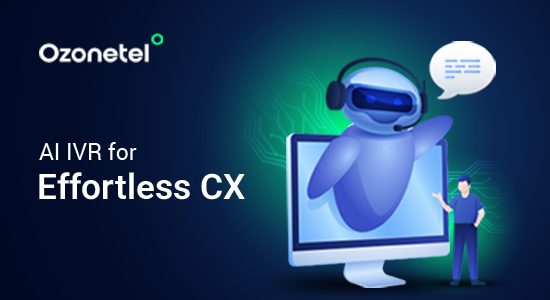- Resources
- 11 Benefits of Cloud Contact Center
11 Benefits of Cloud Contact Center

Rising customer expectations have put businesses under a lot of pressure to deliver exceptional and consistent service experiences while keeping costs under control. Traditional, on-premise contact centers often struggle to meet these expectations due to high maintenance costs, limited scalability, and inflexible infra. In contrast, cloud contact centers offer a flexible and scalable solution that can better meet these rising demands.
Cloud contact centers enable businesses to deliver outstanding customer experiences, streamline operations, and maximize efficiency. They provide flexibility that allows companies to quickly adapt to changes, enhance customer interactions, and effortlessly support remote work environments.
In this article, we’ll delve into the compelling benefits of cloud contact centers, exploring how these solutions can transform your contact center. Read on!
What Are Call Tracking Metrics?
Call tracking metrics are key indicators of the performance and efficiency of a call center. Metrics such as call duration, call volume, first-call resolution rate, and call source offer businesses granular details in the effectiveness of call-related activities. They help in identifying operational bottlenecks, evaluating agent performance, and measuring the overall effectiveness of marketing campaigns and customer service.
For example, by comparing missed and answered calls, you can find missed opportunities that can be quickly followed up on. Alternatively, analyzing call times and dates helps you in determining when your client’s business is most active.
Now, a lot of people confuse call-tracking metrics with key performance indicators (KPIs). While the two concepts are closely linked, they serve different purpose
Call metrics assess the performance of different business operations while KPIs measures progress towards achieving broader business activities. In other words, KPIs are time-bound goals that directly impact the business results.
What is a Cloud Contact Center?
Cloud contact center is a modern, internet-based solution that revolutionizes how businesses interact with their customers. It’s like having a powerful, virtual command center for all your customer communications, accessible from anywhere with an internet connection.
Think of it as your one-stop shop for customer service. Whether you’re a small boutique owner dealing with a sudden influx of inquiries or a large corporation managing global customer support, a cloud contact center adapts to your needs. It provides a user-friendly interface for your agents, advanced features for your managers, and a seamless experience for your customers.
How Does a Cloud Contact Center Work?

Cloud centers, unlike on-premises systems, do not require the purchase, installation, or maintenance of telecom hardware.Instead, phone calls and messages are transmitted via Voice over Internet Protocol (VoIP) technology. This feature turns your audio calls into digital data, which is then delivered over the internet.
A cloud contact center also contains a suite of tools and apps like IVR, call routing, agent management, analytics, and more. These solutions serve as a centralized hub over the internet, allowing a customer support person to manage both inbound and outbound customer conversations.
Example: A stockbroking firm wanted to handle high and fluctuating call volumes, manage agents spread across India, automate repetitive queries and ensure compliance with latest SEBI guidelines.
Business continuity: With Ozonetel cloud contact center solution, the firm could handle 40,000+ calls daily and up to 1340 calls concurrently. They also created redundancies and took fail-safe measures to mitigate telecom outages. This ensured that the stockbroker maintain uninterrupted service even during market shakeout, building trust and reliability.
Self-service IVR: A self-service IVR further automated 35-40% of all incoming calls, reducing the need for agent intervention. Consequently, wait times decreased so significantly that abandon rates fell by 58%.
Intelligent Call Routing: The firm created dedicated teams to handle calls for equity and commodity trading and routed calls to specialized teams reduced Average Handle Times by 25%. In case a call dropped while in queue, the customer receives an automated, priority-based callback.
Remote Agent Flexibility: The brokerage firm employed a team of 650+ agents continue to work remotely — efficiently handling over 1 lakh minutes of conversation daily. They ensured uninterrupted business continuity by directly patching calls to agents’ mobile phones.
Real-Time Monitoring: They employed call monitoring dashboards giving supervisors clear visibility to every agent’s login time, break adherence, and log out time. Screen recordings also simplified remote supervision, allowing unobtrusive monitoring despite the physical distance.
Seamless Integration with CRM: A seamless integration Salesforce CRM & Ozonetel dialer helped agents access customer histories, previous interactions, and personal preferences, enabling more personalized and informed service.
Omnichannel Support: Ozonetel’s cloud contact center integrated various communication channels of the firm, allowing customers to reach out via phone, email, live chat, and social media. All interactions were managed through a single, unified platform.
To get started, you simply choose a provider, configure the software to your needs, and integrate it with your existing systems. Your team can then access the platform using their computers or mobile devices, needing only a stable internet connection and a headset.
Benefits of Cloud Contact Center
Many firms are already adopting work-from-home or hybrid models, meaning that having a remote contact center workforce is essential. Cloud solutions make this easy – agents and supervisors can stay connected and productive from anywhere with an internet connection. The software solution is designed to integrate with all devices and operating systems of your organization.
A few more benefits of cloud contact center are:
 Omnichannel Customer Experience
Omnichannel Customer Experience
Gone are the days when phone calls were the only way to reach customer support. Today, your customers expect to connect with you through various channels, including email, chat, social media, and more. A cloud contact center enables you to meet these expectations seamlessly.
With a cloud-based solution, you can offer a consistent experience across all communication channels. Whether your customer reaches out via Twitter or picks up the phone, they’ll receive the same high-quality service. This versatility not only improves customer satisfaction but also helps you stand out in a competitive market. Plus, many cloud contact centers use AI to handle routine inquiries, freeing up your agents to tackle more complex issues.
Improved Agent Efficiency
Your agents are the backbone of your customer service operation, and a cloud contact center gives them the tools they need to excel. With an intuitive interface, they can easily access customer information across all channels, leading to faster and more accurate problem-solving.
Features like Automatic Call Distribution (ACD), Interactive Voice Response (IVR), and prioritized callbacks help your agents manage their time more effectively. They can focus on the most pressing issues while ensuring no customer is left waiting. Moreover, intelligent routing systems match customers with the most suitable agents, improving both the customer experience and your team’s efficiency.
Seamless Scalability
As your business grows and evolves, your contact center needs to keep pace. A cloud-based solution offers the flexibility to scale up or down as needed, without the headache of hardware planning or installation.
Want to add a new communication channel or expand your team? With a cloud contact center, it’s as simple as flipping a switch. You can easily integrate new features through APIs, allowing you to create the exact customer experience you envision. Plus, most cloud solutions offer pay-as-you-go pricing, so you only pay for what you use. This model eliminates the risk of overcharging and allows you to manage costs more effectively.
Simplified Management
Managing a dispersed team can be challenging, but a cloud contact center makes it easier. Look for a solution that offers robust workforce management tools to keep your team running smoothly, no matter where they’re located.
With AI-powered systems, you can empower your agents to work independently while still maintaining high standards. These tools provide real-time customer context, enable team collaboration, and help you plan staffing based on predicted demand. You can even use AI to analyze customer sentiment and intent, allowing your agents to provide more personalized and effective support.
High Reliability
When you switch to a cloud contact center, you say goodbye to the headaches of maintaining on-premises infrastructure. No more worrying about server crashes or outdated hardware – your cloud provider takes care of all that for you.
This shift allows your IT team to focus on strategic initiatives that drive your business forward, rather than getting bogged down in day-to-day maintenance. Cloud solutions are also designed with redundancy in mind, meaning your contact center can stay up and running even if one system fails. This reliability ensures your customers always have access to support when they need it, boosting their trust in your brand.
Robust Security
When you choose a cloud provider, you’re tapping into their expertise and significant investments in security infrastructure. These providers typically offer compliance with various industry standards, helping you meet regulatory requirements without the hassle. Plus, cloud solutions often come with built-in disaster recovery capabilities. This means that even if one system fails, your contact center can quickly bounce back, ensuring uninterrupted service for your customers.
Effortless Upgrades
Gone are the days of complex, time-consuming system upgrades. With a cloud contact center, staying up-to-date is a breeze. Setting up your cloud contact center is as simple as configuring your queues and reports. You and your team can handle this process without external support, saving time and resources. When it comes to updates, you’ll barely notice them happening. Many cloud systems can run updates in the background while you work, requiring only a quick restart to implement. This means you can always enjoy the latest features and improvements without disrupting your operations.
Global Management (Remote Agents)
With a cloud-based system, your agents can work from anywhere in the world. All they need is an internet connection and their login credentials. This opens up a world of possibilities for your business. You can hire the best talent regardless of location, offer flexible working arrangements to improve employee satisfaction, and even provide 24/7 support by leveraging time zones.
Quick and Easy Deployment
Say goodbye to lengthy, complex installations. Cloud contact centers revolutionize the deployment process, getting you up and running in record time. Unlike traditional on-premises systems that could take months to set up, you can have your cloud contact center operational in just days or weeks.
There’s no need for complicated hardware configurations or endless back-and-forths with IT. Everything from customizing settings to onboarding new employees is streamlined through user-friendly web interfaces. This means you can start reaping the benefits of your new system almost immediately.
Real-Time Customization
With CCaaS, you can track a wide range of contact center KPIs in real time. This wealth of data helps you understand customer behavior and optimize your operations on the fly. Need to adjust your routing strategy or update your IVR? With cloud systems, you can make these changes instantly, ensuring your contact center always performs at its best.
Smooth Integration
Cloud contact centers don’t just improve your customer service operations – they can transform your entire business ecosystem. By centralizing your data in the cloud, you can leverage AI and machine learning to automate processes and gain predictive insights. Want to add a chatbot to your website or implement a virtual assistant? Cloud services make it easy to deploy these cutting-edge tools. The result is a more efficient, future-proof organization that’s always ready to meet evolving customer expectations.
On Premise Vs Cloud Contact Center
A major decision when setting up a contact center in your organization is whether to opt for an on-premises solution or embrace cloud technology. Both options have their merits and drawbacks, and understanding these differences is key to making an informed choice that aligns with your organization’s needs and goals.
Let’s explore the key distinctions between on-premises and cloud contact centers in a little more detail:
| Point of Difference | On-Premises Contact Centers | Cloud Contact Centers |
|---|---|---|
| Setup and Deployment | High upfront costs, time-consuming setup | Lower initial costs, faster deployment |
| Infrastructure | Requires physical space, on-site servers and hardware | Hosted remotely, no need for on-site equipment |
| Maintenance | In-house IT staff needed for upkeep | Maintained by third-party provider |
| Data Security | Greater control over security protocols | Relies on provider’s security measures |
| Features and Analytics | Often less advanced, may lack modern features | Typically more feature-rich with better analytics |
| Remote Work Capability | Limited, usually requires on-site presence | Easily accessible from anywhere |
| Scalability | Challenging, often requires hardware changes | Simple to scale up or down as needed |
| Reliability | Vulnerable to local issues (e.g., power outages) | More reliable due to distributed infrastructure |
| Third-Party Integrations | May require custom coding | Often come with pre-built integrations |
How Can Ozonetel Help Building a Scalable Cloud Contact Center?
Ozonetel offers a comprehensive, AI-powered solution designed to revolutionize customer communications for businesses of all sizes. How? Let’s find out:
Comprehensive Migration Support: Ozonetel provides a structured five-step approach for cloud migration, covering assessment, design, preparation, deployment, and optimization.
Swift Deployment: Ozonetel can deploy a cloud contact center within 24 hours, allowing businesses to quickly transition from legacy systems to the cloud.
Ease of Use: With an intuitive and customizable interface, Ozonetel minimizes training time for staff, making adoption smoother.
Quality Support: Highly rated for their quality of support across third-party review sites, Ozonetel’s experts are ready to assist throughout the cloud transformation journey.
Scalability: Their proprietary, open API cloud-native platform is designed to cater to businesses of all sizes, offering the flexibility to grow as needed.
Seamless Integration: Off-the-shelf AI capabilities enable automation of conversations, call quality audits, and customer experience insights through Conversational AI and Speech Analytics.
AI-Powered Omnichannel Support: Leveraging artificial intelligence and ChatGPT integration, Ozonetel provides intelligent support across all communication channels.
Plus, with over 3,500 businesses successfully migrated to the cloud, Ozonetel is one of the best solutions to automate your cloud migration process and reduce operating costs.
Conclusion
The benefits of cloud contact centers are clear and compelling. From enhanced scalability and cost-effectiveness to improved customer experiences and operational efficiency, cloud-based solutions offer a competitive edge in today’s fast-paced business environment. By embracing cloud technology, companies can stay agile, responsive, and focused on delivering exceptional service to their customers.
For businesses looking to harness these benefits and build a truly scalable, efficient contact center, Ozonetel stands out as a top-tier solution. With its AI-powered platform, omnichannel capabilities, and industry-leading deployment speed, Ozonetel empowers businesses to transform their customer communications and drive growth.
Final thoughts
By choosing the right AI-powered solution, companies can significantly improve customer satisfaction, reduce operational costs, and gain valuable insights into their service performance. And as you decide on the AI call center software to deploy in your organization, consider Ozonetel’s comprehensive suite of AI-powered tools.
Ozonetel offers a robust platform that integrates seamlessly with your existing systems, providing advanced features like intelligent routing, sentiment analysis, and real-time agent assistance. With its user-friendly interface and quick
Want to see what Ozonetel can do for your company? Sign up today for a free 7-day trial.
Prashanth Kancherla
Chief Operating Officer, Ozonetel Communications
Over the past decade, Prashanth has worked with 3000+ customer experience and contact center leaders...
Chief Operating Officer, Ozonetel Communications
Over the past decade, Prashanth has worked with 3000+ customer experience and contact center leaders to comprehensively understand the need for effective and efficient customer communications at every step of their journey with a brand. Deeply embedded in today’s CCaaS ecosystem, he has been instrumental in Ozonetel's growth and contributed in various roles including product management, sales, and solution architecture.
Frequently Asked Questions
The digital experience (DX) is the collection of responses a user or consumer experiences when interacting with a company. This includes digital experience platforms such as the firm website, apps, social media, and chatbots. The goal is to use these digital resources to increase user happiness and create a great customer experience.
The five key components of digital experience are typically user experience design, content strategy and management, personalization and consumer insights, multichannel delivery, and technology and infrastructure. By strategically blending these components, businesses may create a seamless consumer contact that is both interesting and rewarding.
Some common emerging digital experience trends include voice commerce, hyper-personalization, AI-driven customer service and immersive technologies, such as augmented reality (AR) and virtual reality (VR). Adapting to these emerging digital trends will help you remain relevant and competitive in such a saturated market.







